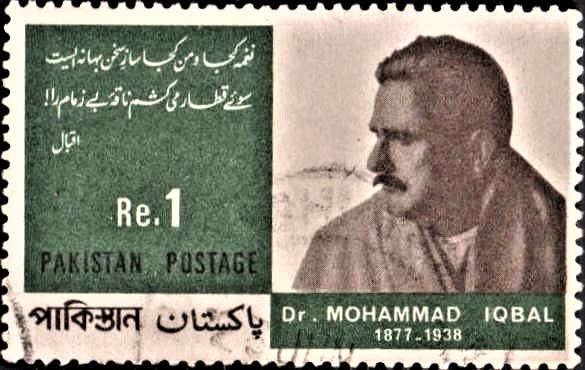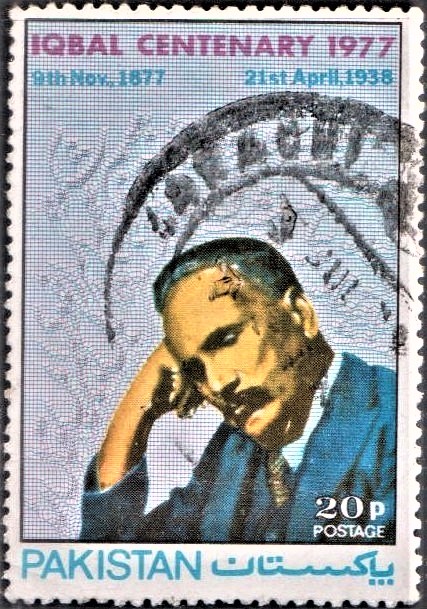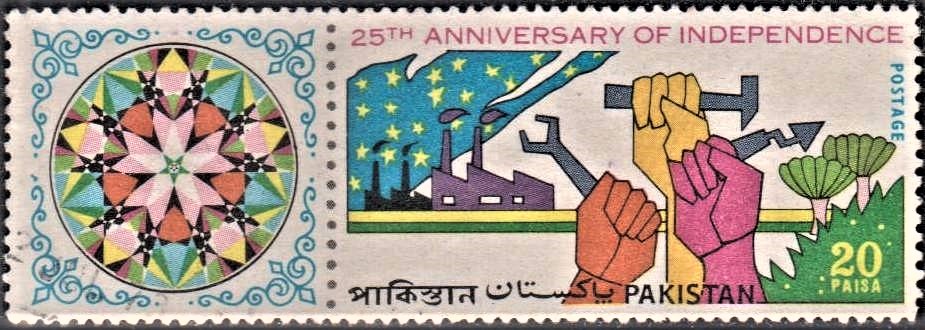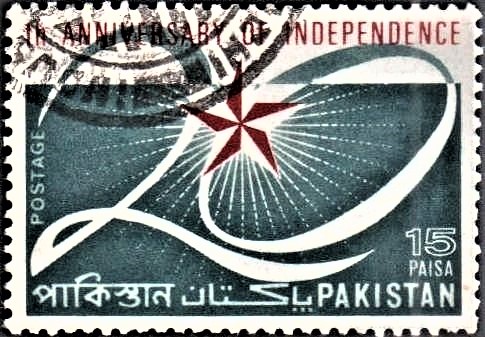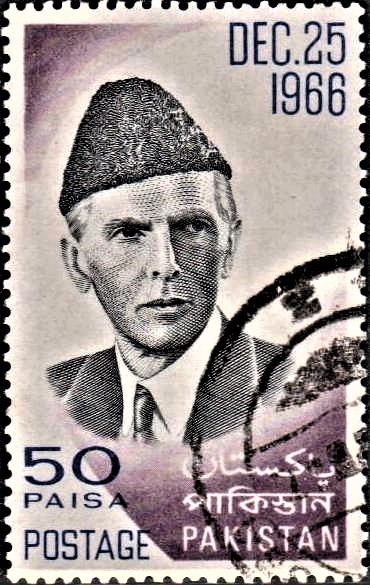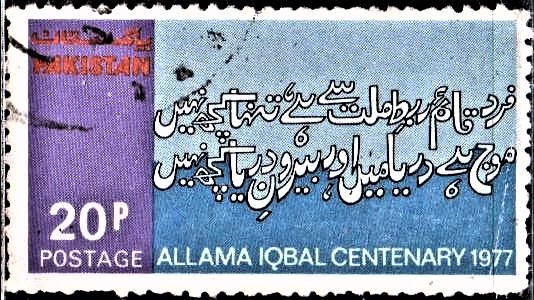
Pakistan on Iqbal Centenary 1977
A commemorative postage stamp on the Birth Centenary of Allama Sir Muhammad Iqbal :
 Issued by Pakistan
Issued by Pakistan
Issued on Nov 9, 1976
Issued for : Pakistan Post Office is issuing a promotional commemorative Postage Stamp of 20 Paisa on 9th November 1976 to announce Allama Iqbal Centenary Year which falls in 1977. Similar promotional stamps were brought out on 9th November 1974 & 1975.
Description : Stamp is horizontal and rectangular in format. One of the famous verses of Allama Iqbal  appears in stylized calligraphy in the blue colour rectangle at right. The first line of the verse appears in white against a light blue colour background representing the sky while the second line appears to float on a wave of river represented by the dark blue portion. The wording “Allama Iqbal Centenary 1977” appears in reverse form at the bottom of the stamp.
appears in stylized calligraphy in the blue colour rectangle at right. The first line of the verse appears in white against a light blue colour background representing the sky while the second line appears to float on a wave of river represented by the dark blue portion. The wording “Allama Iqbal Centenary 1977” appears in reverse form at the bottom of the stamp.
“Pakistan” in Urdu and English together appears in orange colour at the top of the violet panel at left. The denomination figure “20” with the word “Postage” underneath appears in reverse form at the bottom of the panel.
Designer : Mohammad Arif Javed
Type : Stamp, Postal Used
Denomination : 20 Paisa
Colours : Blue, Violet, Orange and Black
Size of Stamp : 44.5 x 24.5 m.m.
Size of Print : 41.5 x 21.5 m.m.
Perforation Gauge : 13 x 13 C
Quantity : 10,00,000 Stamps (one Million)
No. of stamps per sheet : 50 (Fifty)
Process of Printing : Litho Offset
Printers : Pakistan Security Printing Corporation Ltd., Karachi
Name : Muhammad Iqbal
Born on Nov 9, 1877 at Sialkot, Punjab, British India
Died on Apr 21, 1938 at Lahore, Punjab, British India
About :
- Iqbal the great poet philosopher and visionary who played a dominant role in the renaissance of Muslims in India was the first to give a concrete shape to the Muslim aspirations in India for a separate homeland and has rightly been described as the ‘spiritual father of Pakistan‘.
- Coming from a highly respected family of Kashmiri Brahmins who were converted to Islam some three hundred years ago, Iqbal was born at Sialkot on 9th November 1877.
- Iqbal received his early education at the Scotch Mission School and the Murray College, Sialkot. He obtained his Masters degree in Philosophy from the Government College, Lahore. His learned Professor, Sir Thomas Arnold, recognizing his genius, persuaded him to go abroad for higher education. He stayed in Europe from 1905 to 1908 and studied Law and Philosophy at the Universities of Heidelberg, Munich and Cambridge. He was awarded a Ph.D. by the Munich University on his renowned Thesis ‘The Development of Mataphysics Persia‘.
- Although essentially a poet and a philosopher, he was also actively associated with practical politics and played a leading role in the struggle for the emancipation of the Muslims of the Indian sub-continent. Presiding over the annual session of the All India Muslim League at Allahabad in 1930 he boldly asserted the Muslims demand for the creation of Muslim India within India. He firmly believed that Indian Muslims were entitled to a full and free development on the lines of their own culture and tradition for which a separate homeland was necessary.
- This great poet and thinker and upholder of the cause of Muslim fraternity throughout the world, breathed his last on 21st April, 1938 in Lahore and is buried in the premises of the historic Badshahi Mosque there.
- The early period of Iqbal‘s poetry is based upon mostly nationalistic ideas and his love nature. His stay in Europe, however, galvanized his thoughts and after returning to India he was no more a poet of narrow nationalistic feelings. From then onwards one finds in his poetry a dominant note of anti colonialism and a burning rage against the unhealthy influence of western modes of thoughts and feelings. He was imbued with an over-powering passion for the reassertion of the spirit of Islam. His book ‘Reconstruction of Religious Thought in Islam‘ is regarded as a great contribution to Muslim thought, particularly so because of its emphasis on ‘Ijtihad‘.
- Iqbal‘s philosophy has two important aspects. (i) University and (ii) Particularity. He believed in the reality of the individual ego and argued as well for life in a higher, comprehensive, all embracing spiritual world. He believed, on the one hand, in the emancipation and freedom of the Muslims of Indo-Pakistan Sub-continent and on the other, he argued for the unity of Muslim nations all over the world. Iqbal’s political philosophy is not atomistic but organic in that it implied the formation of an association of Muslim countries to better their own lot and be the upholder of peace and justice throughout the world.
- His verses in Urdu and Persian and his monumental treatises have been translated into almost all the important languages of the World and found wide recognition in Iran, Turkey, Egypt, England, France, Germany, Italy, USSR etc.
- An academy named after him has been established by the Government of Pakistan to promote and disseminate the messages and teachings of Allama Iqbal. It is devoted to research on the life, poetry and thoughts of Iqbal and those branches of learning in which he was associated with or interested in. The Government of Pakistan has decided to celebrate the Birth Centenary of Allama Iqbal in November, 1977 in a befitting manner, for which preparation is afoot.
- Issued by : The Director General, Pakistan Post Office, Karachi.


